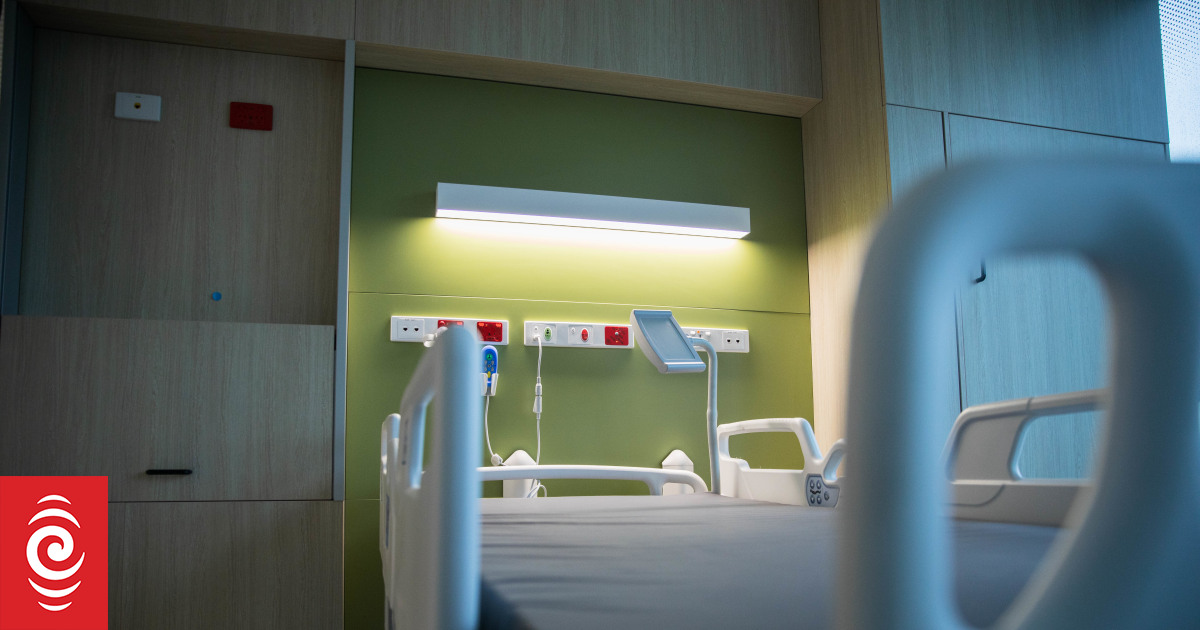Health NZ chief executive Dale Bramley says standard visiting hours will also be aligned nationally.
Photo: RNZ / Samuel Rillstone
Health New Zealand says changes to allow family members to stay with hospital patients around the clock is about valuing family support, but the nurses union says the move has more to do with staffing shortages.
In a note sent out to staff, Health NZ chief executive Dale Bramley said the introduction of a new national Patient and Whānau Family Support Policy was a step to elevate compassion within their culture.
Under the policy, he said: “Whānau will be supported to be with patients 24/7 where appropriate, working alongside our nursing and maternity teams to make this possible, while also respecting the privacy and recovery of others.
“We know from patients and their families that having the support of loved ones at the bedside is one of the things that matters most in their healing journey.”
Health New Zealand chief executive Dale Bramley.
Photo: Supplied / Te Whatu Ora
Bramley said standard visiting hours would also be aligned nationally.
New Zealand Nurses Organisation delegate Al Dietschin said the union supported full access for families to be involved in aspects of a patients’ care, which was very important for many cultures.
However, he said this current push was more a response to the increasing need for patient watches and lack of staff to do them.
Patient watches are often needed if a vulnerable patient, such as those with dementia or delirium, needed monitoring to ensure they didn’t hurt themselves or interfere with their treatment.
Patient watches are usually carried out by a Health Care Assistant or HCA.
“A health care assistant will be with the patient to essentially support them,” Dietschin said.
“Keep them safe, stop them interrupting therapy, like IV therapy or having a catheter in, or trying to get up when they shouldn’t be. It is essentially about keeping them safe and preventing falls, as well as supporting them for daily care like toileting and washing, and sometimes feeding them.
“Because there is a chronic shortage of HCAs, family members may be expected to take on that role.”
He said recently there was such a shortage of HCAs at Christchurch Hospital that patients’ families were asked to come in and help out.
“There are positive aspects to the new policy, but there is also a concern it will be used to replace the missing HCAs,” Dietschin. “Instead of employing more HCAs that are trained and equipped to care for patients in this way, family members will be expected to do this.”
He said certain types of care required specialist training and experience to cope, such as when a patient was agitated or aggressive, and trying to move when they shouldn’t.
“When it comes to mobilising people, we use certain equipment, and families members wouldn’t be trained on how to use that equipment, so it does open a bit of a can of worms,” Dietschin said.
Health New Zealand said the implementation of the new Patient and Whānau/Family Support policy was not driven by staffing levels, but was about giving patients the choice of having whānau support when they needed it.
National chief nurse Nadine Gray said the policy was patient-centred and driven by whānau voice.
She said it would help to ensure a consistent and fair approach at hospital and clinical sites, improving patient and whānau experience.
“It will also help support a broader cultural change to one where whānau support for a patient is valued and recognised, during and outside of usual visiting hours,” Gray said.
“We know from patients that family members play an important role in supporting them in hospital, and have a positive impact on their wellbeing and recovery.”
The new policy was adopted by Whanganui Hospital recently and planning was underway to introduce the policy at southern district hospitals.
The policy will then be gradually be rolled out across the country.
Sign up for Ngā Pitopito Kōrero, a daily newsletter curated by our editors and delivered straight to your inbox every weekday.

